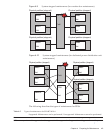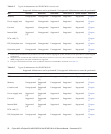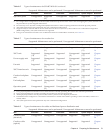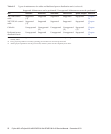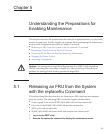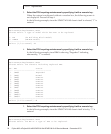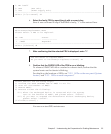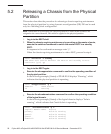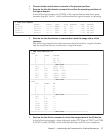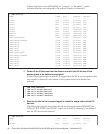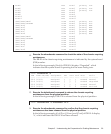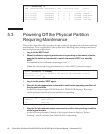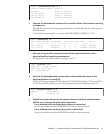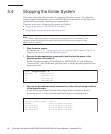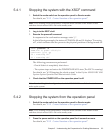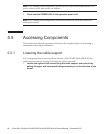
#
ldm list-domain
NAME STATE FLAGS CONS VCPU MEMORY UTIL UPTIME
primary active -n-cv- UART 14 8G 64% 2h 54m
guest0 active -n---- 5000 16 8G 42% 2h 54m
guest1 active -n---- 5001 16 8G 11% 2h 54m
domain01 active -n---- 5002 16 8G 7.3% 2h 54m
#
ldm list-devices -a
CORE
ID %FRE E CPUSET
00(0,1)
40(8,9)
8 0 (16, 17)
----------------------- -Ommitted---------------------- --
184 0 (368, 369)
188 100 (376, 377)
512 100 (1024, 1025)
516 100 (1032, 1033)
520 100 (1040, 1041)
524 100 (1048, 1049)
----------------------- -Ommitted---------------------- --
VCPU
PID %FREE PM
00no
10no
80no
90no
----------------------- -Ommitted---------------------- --
369 0 no
376 100 ---
377 100 ---
1024 100 ---
1025 100 ---
1032 100 ---
1033 100 ---
----------------------- -Ommitted---------------------- -
6.
Connect to the control do main console of the p hysical partition.
7.
Execute the ldm list-domain c ommand to confirm the operating condition of
the logical domain.
In the following example, the [STATE] of the control domain and three guest
domains displays "active", which indicates that the logical domain is operating.
8.
Execute the ldm list-devices -a command t o check the usage status of the
resource.
The following example shows the resources that are bound to a logical domain
and the resources that are not bound to a logical domain.
9.
Execute the ldm list-io command to che ck the u sage status of the I/O device.
In the following example, values displayed under [TYPE] are all "BUS" for PCIE0
to PCIE11 under [NAME], which indicates that they are PCIe root complexes.
Chapter 5 Understanding the Preparations for Enabling Maintenance 57



